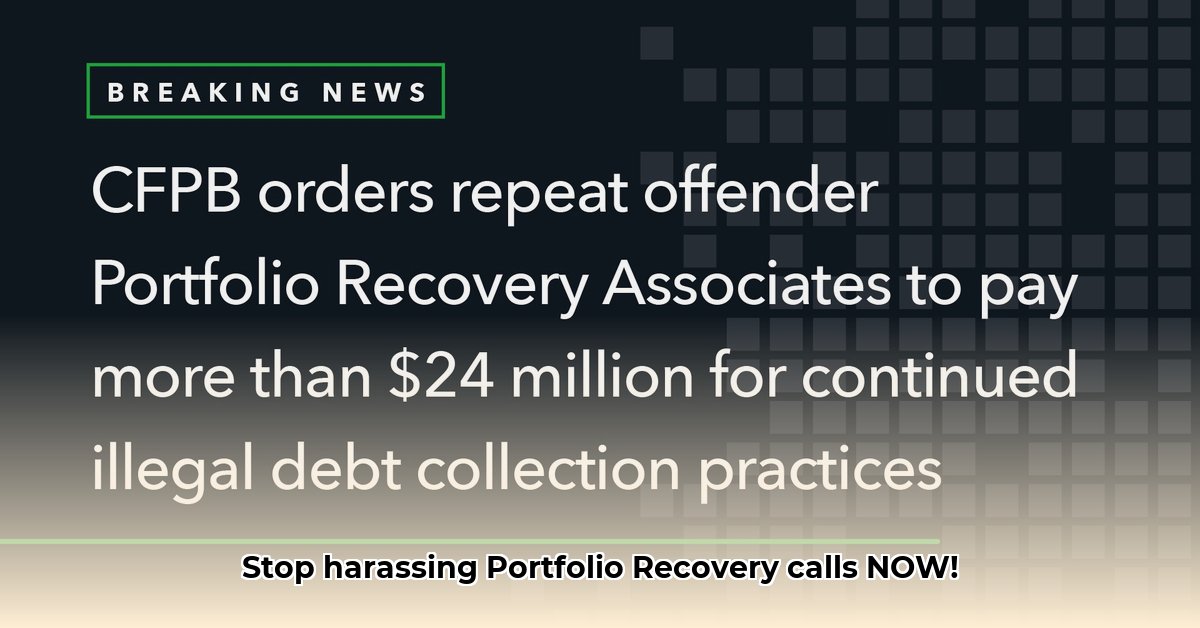
Portfolio Recovery Associates (PRA) Keeps Calling: What to Do
Are persistent calls from Portfolio Recovery Associates (PRA) causing stress? You're not alone. Many consumers face this frustrating situation. This guide empowers you to handle these calls effectively, protecting your rights and finding a resolution.
Understanding the Calls – Why Are They Calling?
PRA is contacting you because they believe you owe money—debt they likely purchased from another company. Crucially, their calls don't automatically mean you owe anything. Your rights under the law are your protection.
Verifying the Debt – Is It Legitimate?
Before paying, verify the debt's legitimacy. The Fair Debt Collection Practices Act (FDCPA) (a federal law protecting consumers) requires PRA to prove the debt is yours if you request it.
Step 1: Send a Debt Validation Letter
Send a certified letter (certified mail with return receipt requested) formally requesting debt validation. Include your name, address, account number (if available), and specifically request:
- The original creditor's name (the company you initially owed).
- The exact amount owed.
- A copy of the original agreement showing the debt.
Step 2: Analyze Their Response
PRA has 30 days to respond. Carefully review their response. Are the details accurate and complete? Discrepancies or a lack of proof give you grounds to dispute the debt. Do you have any questions about this process?
Dealing with Persistent Calls – What's Legal, What's Not
Even after your validation letter, calls might continue. The FDCPA dictates how debt collectors can contact you.
Legal Actions by Debt Collectors:
- Calling during reasonable hours (generally 8 am to 9 pm).
- Contacting you once to confirm your payment intent or dispute before further correspondence.
- Discussing the debt professionally.
Illegal Actions by Debt Collectors:
- Using harassing or abusive language (yelling, threats).
- Calling outside of reasonable hours.
- Repeated calls after you've requested them to stop.
- Contacting third parties without your authorization.
If PRA Violates the Law – Document Everything
If PRA violates the FDCPA:
- Meticulously document each call: Note the date, time, and a detailed summary of the conversation.
- Send a cease-and-desist letter: Inform them in writing that their calls are illegal and you'll pursue legal action if they don't stop. Use registered mail.
- Consult a consumer protection attorney: A lawyer can advise you on legal action and potential compensation for FDCPA violations.
Disputing the Debt – Proving They're Wrong
If debt information is incorrect, the statute of limitations has passed, or you have proof you don't owe, promptly inform PRA of your dispute. Provide evidence and reiterate your dispute. Keep copies of everything.
Negotiating a Settlement – If You Owe
If you've verified the debt and will pay, negotiate a lower settlement amount. Debt settlement companies might help; however, be aware that this affects your credit report.
Other Options – What Else Can You Do?
Consider these options:
- Debt consolidation: Combining debts into one manageable payment.
- Credit counseling: Working with a counselor to budget and repay debts.
- Bankruptcy: A last resort, providing legal protection from creditors; consult a bankruptcy attorney. A financial advisor can offer personalized advice.
Preventing Future Problems
- Pay bills on time.
- Regularly review your credit reports from Equifax, Experian, and TransUnion.
- Report inaccuracies immediately.
- Carefully read contracts before signing.
This guide offers general guidance and isn't legal advice. Consult legal and financial professionals for personalized advice.
How to Dispute Inaccurate Debt Information from Portfolio Recovery Associates
Key Takeaways:
- PRA has a formal dispute process, but its effectiveness varies.
- Consumers report ongoing harassment despite attempts to stop contact.
- Legal intervention is often necessary.
- Understanding the FDCPA is crucial.
- Documenting all communication is key.
Understanding Your Rights
Feeling overwhelmed by PRA's calls? The FDCPA protects you from abusive debt collection. Knowing your rights is crucial.
How to Dispute Inaccurate Debt Information from Portfolio Recovery Associates
Step 1: Verify the Debt. Confirm the debt is yours, checking the amount, date, and legal validity. Many debts have a statute of limitations (meaning they’re too old to legally collect).
Step 2: Send a Debt Validation Letter. Send a certified letter requesting proof of the debt. Be specific.
Step 3: PRA's Dispute Process. Use PRA's website (1) to find their dispute process (often online forms or mail). Follow instructions carefully.
Step 4: Document Everything. Document every interaction with PRA: dates, times, methods, and content.
Step 5: Consider Legal Counsel. If PRA continues aggressive tactics, consult a consumer rights attorney.
What if PRA Doesn't Respond or Refuses to Validate?
If PRA ignores your request or doesn't provide proof, you have grounds to challenge the debt. A lawyer can help.
Proactive Steps:
- Regularly check your credit reports.
- Communicate promptly with creditors.
- Understand your rights under the FDCPA.
You are not powerless. By understanding your rights and using available resources, you can effectively dispute inaccurate debt information and protect your financial well-being.